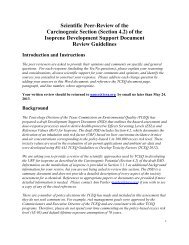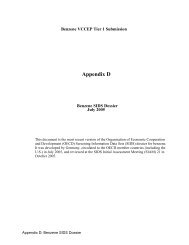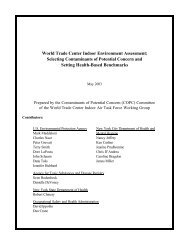(VCCEP) Tier 1 Pilot Submission for BENZENE - Tera
(VCCEP) Tier 1 Pilot Submission for BENZENE - Tera
(VCCEP) Tier 1 Pilot Submission for BENZENE - Tera
You also want an ePaper? Increase the reach of your titles
YUMPU automatically turns print PDFs into web optimized ePapers that Google loves.
6.1.12e Conclusions<br />
Based on a recent review of all available scientific evidence, it is not possible to reach definitive<br />
conclusions regarding human developmental and/or reproductive toxicity of benzene. Relevant<br />
studies were severely limited by small populations of subjects, poorly defined or missing<br />
exposure in<strong>for</strong>mation (including exposure to other confounding chemicals), as well as recall and<br />
selection bias. Most epidemiology studies evaluating the potential relationship between<br />
benzene and reproductive/developmental toxicity are case control studies. Case-control<br />
studies, while useful tools <strong>for</strong> generating hypotheses, rarely provide reliable quantitative<br />
exposure data. As a result, it is not possible to use data from most case-control studies in a<br />
quantitative risk assessment.<br />
Reproductive epidemiology presents quite a challenge to investigators, in both study design and<br />
conduct. Many of the endpoints of interest (e.g., menstrual cycle abnormalities or spontaneous<br />
abortions) are relatively common occurrences in the human population. This fact compounds<br />
the difficulties faced by investigators attempting to establish environmental or occupational<br />
causes <strong>for</strong> reproductive endpoints. Additional confounders, such as diet, genetics, and lifestyle<br />
factors all likely play a role in the background incidence of these events. As such, without<br />
careful control of these confounder factors, appropriate interpretation of any data collected is<br />
greatly complicated.<br />
These and other shortcomings in the available data have been reviewed by several<br />
organizations, including the ATSDR, the US EPA and the European Union (EU). To date, no<br />
federal regulatory agency or scientific body has established a regulatory toxicity value <strong>for</strong><br />
benzene based on the reproductive or developmental toxicity in humans. The data are not<br />
robust enough <strong>for</strong> such a determination. The Organization <strong>for</strong> Economic Cooperation and<br />
Development (OECD) reviewed the EU risk assessment and concluded:<br />
"Evidence from human data <strong>for</strong> an effect of benzene exposure on female reproduction is<br />
not sufficient to demonstrate a causal association due to poorly designed studies and<br />
inadequately quantified exposure to benzene as well as to other chemicals.<br />
Epidemiological studies in males on effects on fertility are not available. Likewise<br />
epidemiological studies implicating benzene as a developmental toxicant have many<br />
limitations thus not providing sufficient in<strong>for</strong>mation to assess the effects on the human<br />
fetus." (OECD, 2005)<br />
As described herein, there are poorly documented studies that are suggestive of an association<br />
between un-quantified benzene exposures and maternal toxicity in the <strong>for</strong>m of menstrual<br />
alterations. Additionally, there are both positive and negative studies on the potential adverse<br />
effect on the human fetus following parental exposure to benzene, including spontaneous<br />
abortion, low birth weight or specific mal<strong>for</strong>mations. While leukemia studies are consistent in<br />
their demonstration that parental exposure to benzene is not casually related to the<br />
development of ALL, there is limited evidence <strong>for</strong> a potential association with childhood AML<br />
(which has not been independently evaluated). Problems and short-comings inherent in the<br />
specific studies preclude the development of a causal relationship between these reported<br />
adverse effects and benzene exposure. In the absence of additional, more reliable data, it is<br />
not currently possible to conclude that parental benzene exposure will adversely affect the<br />
developing fetus (including the development of AML) or adversely effect reproductive function in<br />
either exposed parent.<br />
Benzene <strong>VCCEP</strong> <strong>Submission</strong><br />
March 2006<br />
57





